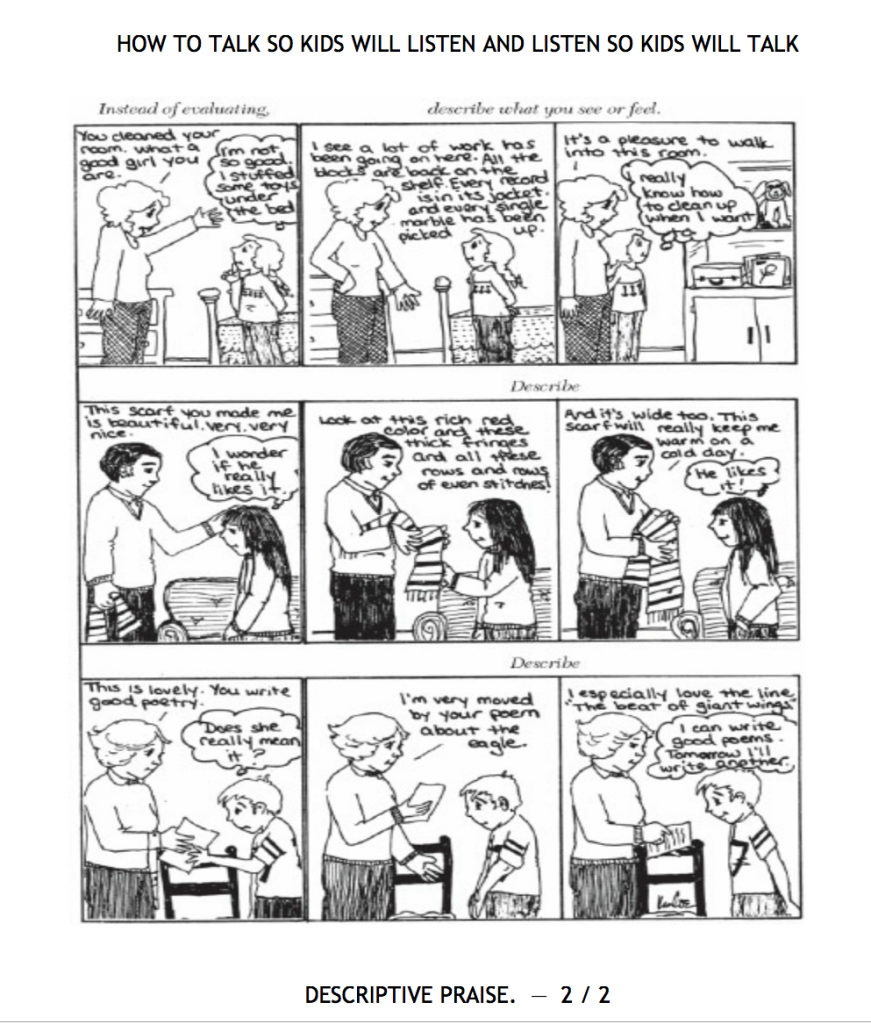
source fincherwannettaedm310.blogspot.my
“Dad, today I got my examination result. I got 70%” Ahmad told his father when he got into the car.
“Awesome. I love you” daddy replied.
“Hmm… did he mean what he said? 70% is not a good grade. Why did he praise me?” Ahmad had this thought in his mind. He doubted his father’s praise.
Today, in our school, we had our weekly circle for teachers. Our CEO was discussing about the art of praise as a form of reward to reinforce good behaviour. Culturally, it is not a very common thing for us to praise good behaviour. When our children or students do mistakes, we spontaneously realise them and we give them remark. But if they put their shoes in order, place their bags nicely as they supposed to do, we tend to ignore them, or our sight simply miss them.
Praising good behaviour is needed.
But at the same time, we need to improve the way we praise.
The evaluative praise is easy especially when you already have the habit.
Good!
Awesome!
This is beautiful!
This type of praise works well for beginners.
But we will reach one point where the praise itself sparks doubt. Especially in our society where praising each other has not overcome sarcasm and say double meaning words. The unspecified praise can also mislead our children or students. We want to praise the doing, but being unspecified, we praise the doer. The doer got confused. What did I do that makes me deserved the praise?
We need to upgrade evaluative praise to descriptive praise. Descriptive in a sense that the praise is describing specifically the subject.
source: How To Talk So Kids Will Listen and Listen So Kids Will Talk
“Dad, today I got my examination result. I got 70%” Ahmad told his father when he got into the car.
“Awesome. I still remember that last semester you got around 60%. It is a good improvement. Keep up the good job. I love you, Ahmad” daddy replied.
“Owh, I thought it is not so good. But yes, there is an improvement and my dad acknowledges it” Ahmad’s inner speech is improved and becoming more positive.
I would say, this is one of the essence we can get from understanding the concept of qawlan sadīdā from surah al-Ahzāb verse 70:

“O you who believe, fear Allah and speak words straight to the point”
Sadīdā comes from the word sadd in Arabic which gives the meaning to contaminate, and direct something towards the intended direction. So when we describe our words as sadīdā, it means that we use the words that lead to the right direction and contain the right meaning. Precise!
When we speak, choose the right words, the right way to say the words, which will lead to the right outcome. This requires a good level of consciousness and wisdom. One might ask, why so fussy about it. Then, Allah relates the important of choosing the right words to the faith itself. Iman and Taqwa. If you consider yourself as a believer in Allah, fear Him and speak using the right words.
He will [then] amend for you your deeds and forgive you your sins. And whoever obeys Allah and His Messenger has certainly attained a great attainment.
And Allah promise us, worldly, He will adjust your work for your and spiritually, He will forgive your sins. By doing this, you obey Him and His Messenger and whoever has that quality, he verily hath the signal victory.
Don’t curse or swear, dear teachers and parents.
Praise.
And improve the way we praise.
Be more descriptive.
Let our praise understood by our students and children.
Allah will forgive us and make our work success, ameen.
HASRIZAL
Khalifah Model School Secondary

